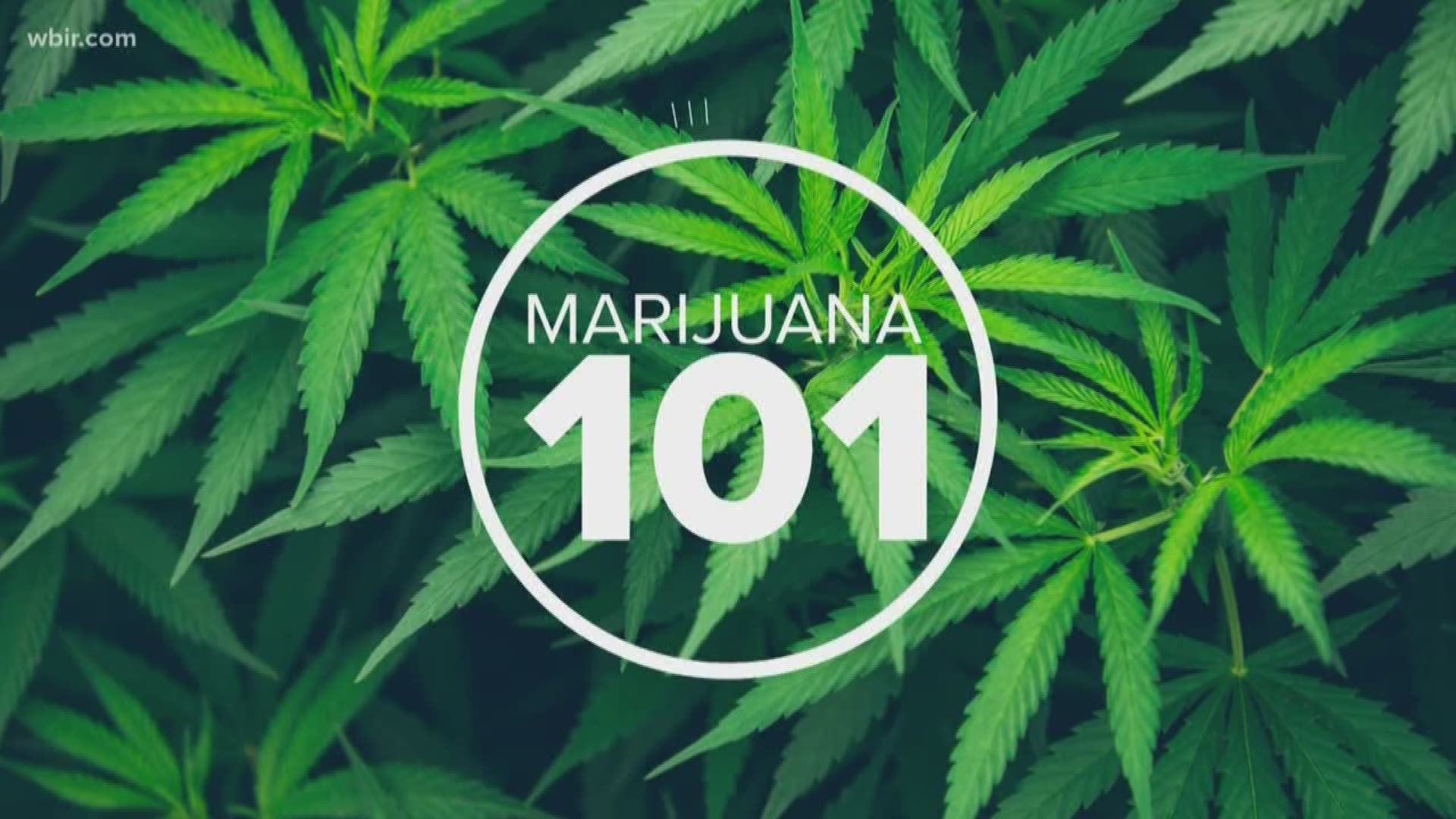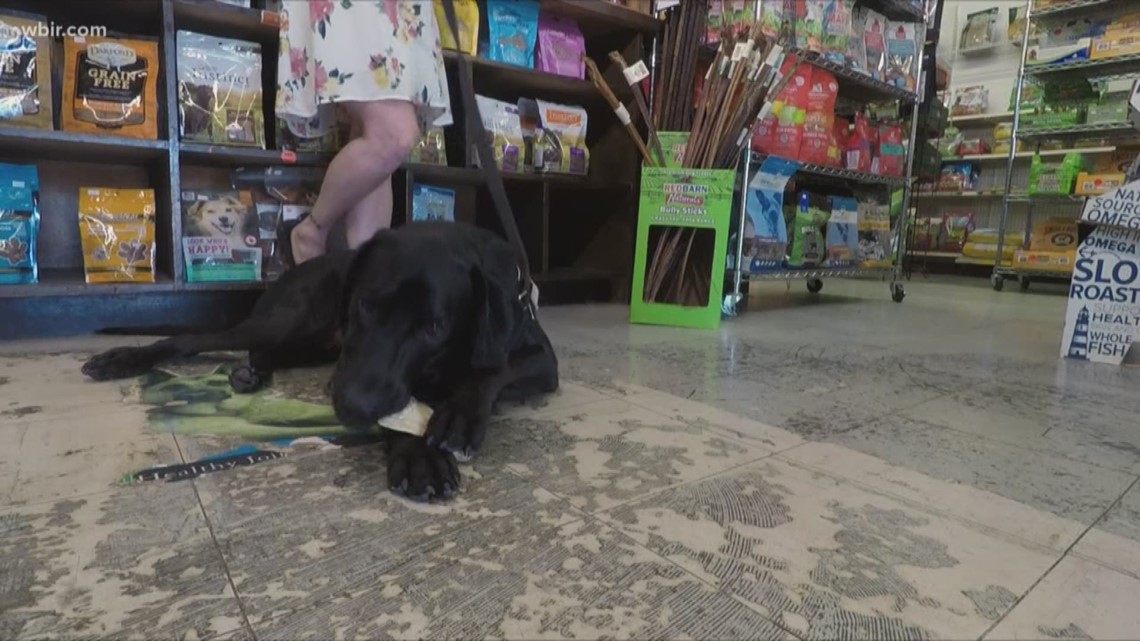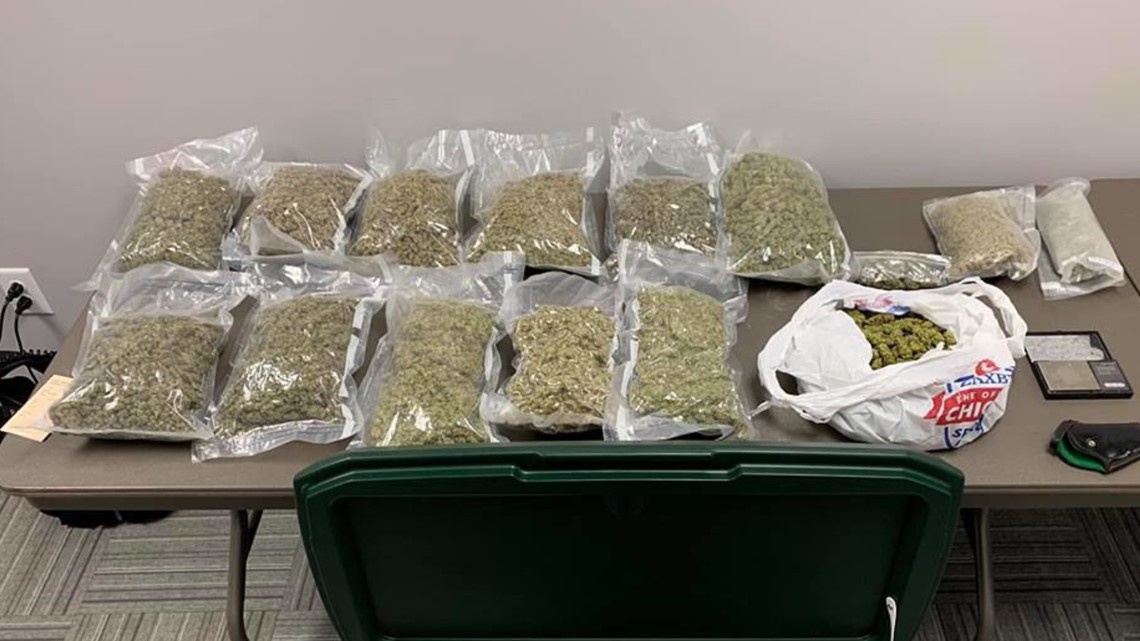What is the difference between Marijuana, Cannabis, Hemp, THC and CBD?
Some of you may be saying 'Really?" on this one, but there are some important distinctions to be made here that often get confused -- because while marijuana is cannabis, not all cannabis is marijuana.
Cannabis as a term has colloquially become interlinked as a more 'official' generic name for the drug marijuana, however the word itself is formally used to describe the three main species of flowering plants under the Cannabaceae family: Cannabis sativa, Cannabis indica, and the lesser-known Cannabis ruderalis.
Under each of those three species are dozens of strains of plants, including legal hemp, which contain varying levels two primary active components: THC, the psychoactive component that's widely illegal because of the high it produces, and CBD, the largely legal, lesser-psychoactive component that doesn't provide an intoxicating high.
Depending on the strain, it may contain more THC or more CBD, or it may have a balanced ratio of the two. On top of that, the parts of the plant factor in.
Marijuana generally comes from various strains of the female portions of Cannabis plants -- it's namely the flowering bud that contains concentrated amounts of THC and varying levels of CBD to provide a desired high. Despite the popular imagery, the large fanning 'pot leaf' itself isn't widely used to get high, though clusters of undeveloped leaves can contain concentrated amounts of THC.
The drug was reportedly used by 37.6 million users in the past year. On the federal level, marijuana remains a Schedule I drug and is illegal on the same level as heroin, peyote, ecstasy and LSD. According to the DEA's definition, a Schedule I drug is one that has a 'high potential for abuse' and has 'no currently accepted medical use' in the U.S.
►Marijuana 101: A Knoxville woman says medical marijuana kicked her opioid addiction. Now she wants it legalized
Supporters of marijuana legalization and a growing number of medical experts refute the DEA's assessment, saying marijuana and THC have clear and substantiated medical purposes -- from low-risk pain management to treatment for epilepsy and glaucoma. Amid this push for federal legalization, the drug has seen rapid legalization in the past decade on the state level, with 34 states plus Washington D.C. legalizing the drug medically and allowing it to be prescribed for a wide variety of reasons.
Hemp -- the kind that's grown legally in the U.S. for industrial and commercial purposes -- is a strain of Cannabis sativa. While it does contain small amounts of THC as a cannabis plant, its industrial-approved strain contains THC levels less than 0.3 percent concentration as allowed by 2018's federal 'Farm Bill.' That level is not enough to produce a mind-altering high and contains higher concentrations of CBD -- though those CBD levels are purportedly much lower than would be found in other cannabis strains that also have higher THC content.
Hemp is being farmed more and more now as the demand for CBD products grows. It's also used to produce a variety of products from rope, animal feed, clothes, and hemp seed oil (which does not contain either CBD or THC).Tennessee has embraced hemp with open arms as a potential cash crop, and the boom is just beginning after the state issued nearly 3,000 licenses for new hemp farmers this year.
CBD (Cannabidiol) is extracted from any number of strains of Cannabis like THC, but the various forms of CBD you can find sold legally in most stores will more likely be derived from hemp (or be confused with various hemp oils which contain no CBD). In states where medical and recreational marijuana is legal, CBD may also be extracted from non-hemp strains and have higher THC concentrations.
Tennessee allows THC levels of 0.9% and below in CBD products, though this will still lead to problems at federal TSA checkpoints where CBD is only allowed to have 0.3% THC concentrations.
CBD is more and more being used over-the-counter to holistically treat pain and anxiety, and it's rapidly growing in popularity with CBD now being sold in more chain stores. There's growing medical evidence to CBD's broad therapeutic benefits and it may eventually be recognized as formal treatment for numerous conditions, but as of now CBD's only prescribed use is the FDA-approved brand 'Epidiolex,' which is used to treat two serious types of epilepsy.
Some people also say CBD is effective in helping their pets with certain issues, such as anxiety.
Where do Tennessee lawmakers stand on legalization?
A vast majority of 600 registered voters across Tennessee polled by Middle Tennessee State University in 2018 supported the legalization of marijuana to some extent.
On the legalization of marijuana, 81% of Tennessee voters polled supported legalization to some extent, 37% said marijuana should be legal for personal use, while 44% said marijuana should only be legal for medicinal purposes. 16% believe marijuana should remain totally illegal.
More than 300 people voted during a 10News Nightbeat interactive poll on Monday asking whether they feel medical marijuana should be legalized. By the end of the show, 86% said they feel Tennessee should legalize medical marijuana.

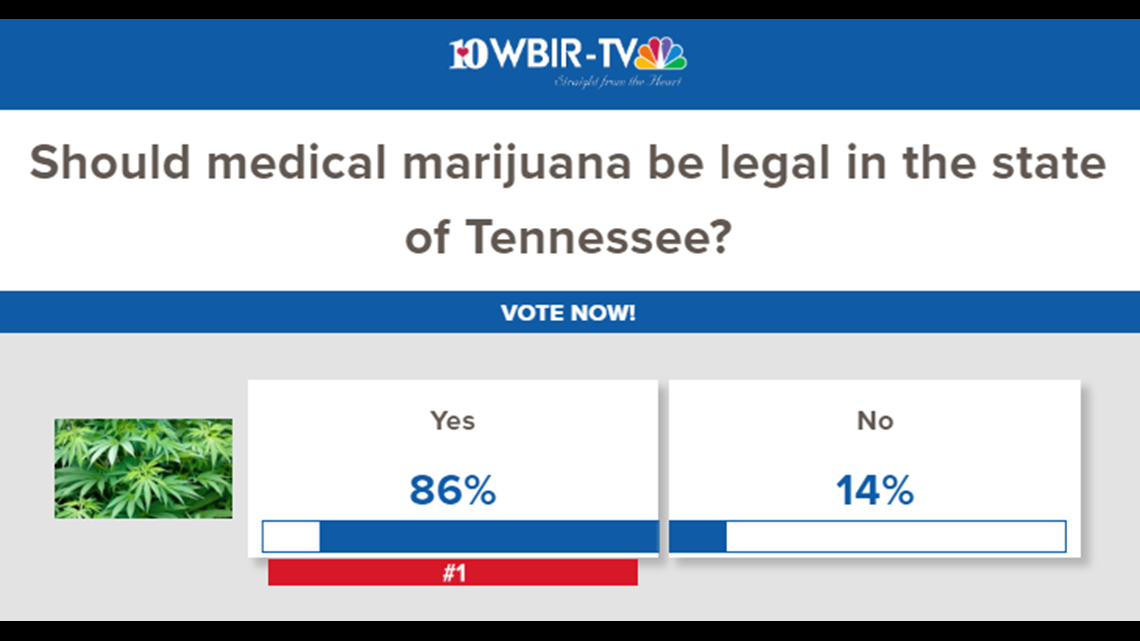
Given the large support for legalization across the state, we asked all lawmakers in the Tennessee House and Senate during the general session to answer a few simple 'yes or no' questions on whether they support medical or recreational marijuana legalization.
We also asked if they supported a ballot vote on either issue. Tennessee is not a referendum state -- meaning the public can't simply petition to hold a popular vote on issues. There have been rare referendum votes in the past such as the 2002 vote to establish the state lottery, however the state-wide vote had to first be approved by the legislature in two successive sessions and was limited in scope -- as referendums are generally reserved for creating an amendment in the state constitution.
Most of the 132 lawmakers in the Senate and House did not provide a response. Less than 25 lawmakers weighed in on the topic, including the Lt. Governor. Many were supportive of medical marijuana legalization in some form, but most were against recreational legalization at this point in time:
►Gov. Bill Lee (R) - Prior to taking office, Lee said he remained unconvinced of marijuana's medical benefits. He previously said he was opposed to its legalization or decriminalization in any form:
"I think we ought to expand the use of low THC/CBD oils first to alternative treatments before we go there."
►Lt. Governor Randy McNally (R) - No to medical as long as it federally remains classified as a Schedule I drug, No in general to recreational.
►Sen. Richard Briggs (R-Knoxville) - No to both.
►Sen. Becky Massey (R-Knoxville) - Yes to medical with 'guardrails to discourage abuse,' No to recreational.
►Rep. Martin Daniel (R-Knoxville) - Yes to medical with 'strict limitations and controls,' No to recreational.
►Rep. Bill Dunn (R-Knoxville) - No to recreational, generally medical would need to be tested and approved by the FDA.
"There are many versions of medical marijuana bills. Not all are the same not all are equal."
►Rep. Gloria Johnson (D-Knoxville) - Yes to medical, undecided on recreational.
"I believe if the people would like to vote on this issue, they should be allowed to do so, however, I would like to see more factual information shared on the topic before the vote happens. When considering policy that is in effect in other states, we should be able to present the facts with pros and cons so folks can make an educated choice, including information from other states that have already enacted the policy."
►Rep. Rick Staples (D-Knoxville) - Yes to both. Staples was co-sponsor to a piece of medical marijuana legislation.
►Rep. Jason Zachary (R-Knoxville) - No to both (If it were possible, he would support the topic being brought up for a vote).
►Sen. Art Swann (R-Maryville) - Conditionally could support medical -- so long as it is not grown in Tennessee, No to recreational
►Rep. Bob Ramsey (R-Maryville) - Yes to medical, no to recreational.
►Rep. Cameron Sexton (R-Crossville) - No to both until federal laws are changed to remove marijuana's status as a Schedule 1 drug.
►Rep. John Ragan (R-Oak Ridge) - No to both.
►Rep. Lowell Russell (R-Vonore) - No to both, but is open to having a vote on the matter and could possibly support medical marijuana over time as more states legalize it:
"I am open to medical marijuana, but depending on data from states that already have medical marijuana. We don’t need another crisis similar to opioids. Back in the late 90’s a lot of people thought opioids were great, and now we have a major problem. We don’t need to create another problem."
►Rep. Cameron Sexton (R-Bean Station) - Did not assert clear support or disapproval:
"Before anything can be done - the federal government needs to take action and change the schedule 1 of marijuana. Schedule 1 makes it an illegal drug in America."
►Rep. Mark Hall (R-Cleveland) - Responded to say he had no comment at this time.
►Rep. Bud Hulsey (R-Kingsport) - No to both.
►Rep. John Ray Clemmons (D - Nashville) - Yes to both
"There is an overwhelming amount of support across the state for medical marijuana. It is truly unfortunate that a group of older state senators continue to prevent Tennesseans from accessing this viable medical option. We have the opportunity, with appropriately crafted legislation, to accomplish several positive things. First, we can provide patients with a natural alternative to pharmaceuticals. Next, we can help the local economies of distressed counties and struggling family farmers across the state by providing them with a new, reliable cash crop. Finally, we can generate new revenue for much-needed infrastructure projects across the state without placing an additional regressive tax burden on the backs of Tennessee families."
►Rep. Bob Freeman (D-Nashville) - Yes to both
►Rep. Jason Hodges (D-Clarksville) - Yes to both.
►Sen. Janice Bowling (R- Tullahoma): Supports legalization of medical cannabis with guidelines, co-sponsored a bill that failed to advance beyond subcommittee last session known as the 'Tennessee Medical Cannabis Act.'
►Rep. Antonio Parkinson (D-Memphis) - Yes to both
►Rep. Barbara Cooper (D-Memphis) - Undecided on both
"I am not sure about supporting this issue without additional specific research that will affect families’ health and incarceration. Thanks for the inquiry as I continue to study the advantages and disadvantages of marijuana use. Moreover, constituency awareness is required and input heard prior to decision making."
►Rep. Ron Travis (R-Dayton) - Supports legalization of medical cannabis with guidelines, co-sponsored the 'Tennessee Medical Cannabis Act' that failed last session.
►Sen. Shane Reeves (R-District 14) - Yes to medical with strict criteria, No to recreational.
►Rep. Scott Cepicky (R-Culleoka) - Yes to medical, No to recreational
►Rep. Jeremy Faison (R-Cosby) - 'Unequivocally' supports medical marijuana legislation, and has supported legalization efforts in the past.
Rep. Faison recently sat down with Karen Pershing, the executive director of the Knox County Metro Drug Coalition, to debate their opposing views on the issue of medical marijuana legalization in Tennessee.
Faison believes medical marijuana has medicinal purposes that would also offer a safer alternative to some legal prescription painkillers at the center of the opioid epidemic, while Pershing argues it could facilitate more cases of abuse and addiction, while also posing threats specifically to adolescents.
You can watch the full discussion below or at this link:
Where is marijuana use legal?
As of May 13, 2019 -- Medical marijuana use is legal in 34 states plus Washington D.C. in some form. Only 10 states and D.C. have legalized it for recreational use, as well.
In Tennessee, Kentucky and Virginia -- marijuana is fully illegal and is not decriminalized. Both Nashville and Memphis passed short-lived local ordinances decriminalizing marijuana possession, however former Gov. Bill Haslam signed legislation back in 2017 that repealed those ordinances.
Tennessee considers marijuana possession a misdemeanor offense on very small amounts less than half an ounce on the first and second offense. For Kentucky, misdemeanor amounts are anything less than 8 ounces. Virginia broadly considers simple possession a misdemeanor.

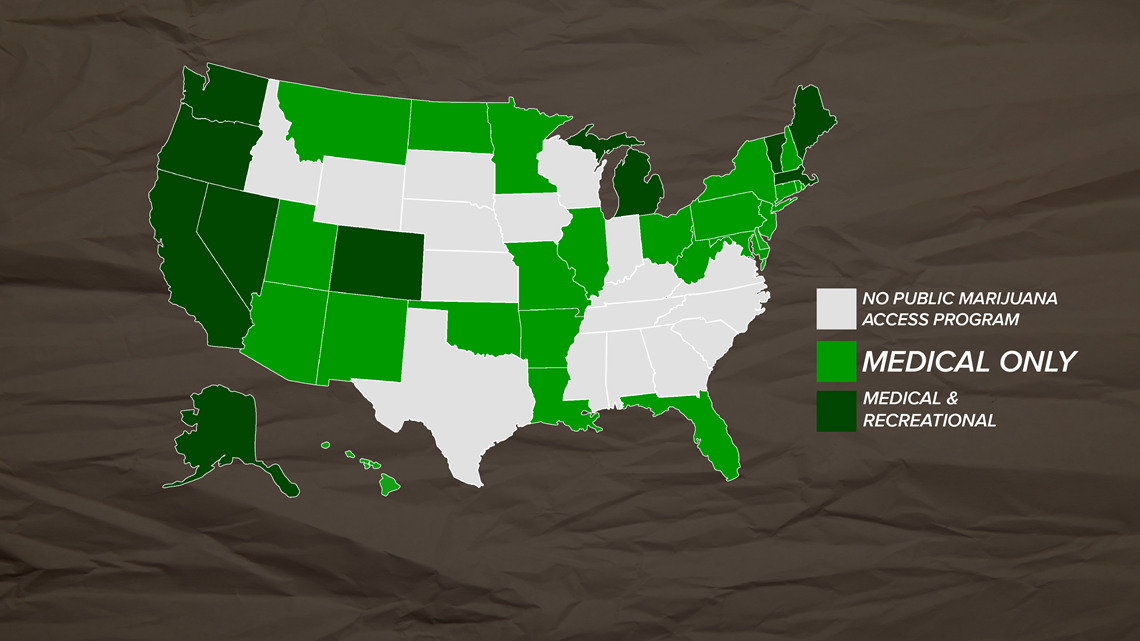
So far, Alaska, California, Colorado, Maine, Massachusetts, Michigan, Nevada, Oregon, Vermont, Washington, and D.C. have fully legalized marijuana for both recreational and medical purposes in some form.
Arizona, Arkansas, Connecticut, Delaware, Florida, Georgia, Hawaii, Illinois, Louisiana, Maryland, Minnesota, Missouri, Montana, New Hampshire, New Jersey, New Mexico, New York, North Dakota, Ohio, Oklahoma, Pennsylvania, Rhode Island, Utah, and West Virginia have legalized it for medicinal purposes only.
Some states have also decriminalized marijuana in various forms -- which generally will charge people caught with small amounts a fine or hand our reduced penalties so long as the amount possessed remains under the state's criminal threshold.
Of the states where both medical and recreational marijuana are still illegal: Mississippi, Nebraska and North Carolina are the only three states currently to decriminalize possession under a small amount.
Where medical marijuana has been legalized but not recreational: Connecticut, Delaware, Illinois, Maryland, Minnesota, Missouri, New Hampshire, New Mexico, New York, Ohio, and Rhode Island have decriminalized minor possession in some form.
Marijuana is legal in some U.S. territories. Guam and the Northern Mariana Islands have fully legalized the drug for recreational and medical purposes. Puerto Rico and the U.S. Virgin Islands allow medical use only, with the drug being decriminalized in the latter. The drug is fully illegal in American Somoa.

